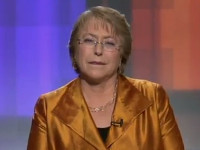Michelle Bachelet to cause too much headache for USA
Michelle Bachelet was elected president of Chile for the second time. Her election says that the Chilean society is ready for a serious change. In terms of foreign policy, Bachelet is expected to establish closer ties with Brazil and depart from the support of the U.S. policy in the region.

On Sunday, 62-year-old Michelle Bachelet from the coalition "New Majority" has secured over 60 percent of the vote during the second round of election, while her rival from the right block, a candidate from the ruling conservative party "Alliance for Chile" Evelyn Matthei was given only 37.7 percent.
After the return of democracy in 1990 Bachelet became the first Chilean politician who won two presidential mandates. Bachelet said in her first speech after being reelected that she was there because the people believed that Chile was in need of changes. She promised that it would not be easy, but added that easy things do not change the world. She won her first presidential elections in 2006 and resigned four years later (with 80 percent approval rating) because, under the Constitution, she had no right to run for the second consecutive term.
In September of 2010, Bachelet was elected as the first executive director of "UN Women," a newly created international agency upholding gender equality. In 2013, she resigned from the post to prepare for the presidential elections. Few doubted her victory.
Veronica Michelle Bachelet was born on September 29, 1951 in Santiago. Her father is General Alberto Bachelet (1923 - 1974), mother - Angela Jeria Gómez, an anthropologist by profession who has just turned 87 years old. The family's liberal ideas were accompanied by military discipline, love for classical music, and passion for Chilean and Argentine folklore. In 1970, Michelle was admitted to the School of Medicine at the University of Chile. During the first year of training she joined the ranks of the Socialist Party. The day of a military coup on September 11, 1973 has drastically changed her life and the lives of many Chileans. Her father who served in the government of Allende refused to support the coup, was arrested, tortured, and soon died "of a heart attack." Michelle and her mother were arrested in January of 1975, questioned by DINA police, and were then transferred to a torture prison in Los Alamos. However, Michelle's brother Alberto provided assistance, and thanks to his protection the family was able to immigrate to Australia first, and then the GDR.
There Michelle married a famous architect Jaime Davalos and had two children - Sebastian (1978) and Frances (1984). The couple returned to Chile in 1979. Michelle graduated from the University majoring in pediatrics and got actively involved in the work of the Socialist Party. After her divorce in 1992 she had a daughter, Sofia, from a relationship with a doctor Anibal Henriquez.
In 2000, Bachelet headed the Ministry of Health in the government of President Ricardo Lagos, and two years later - the Ministry of Defense. She gained popularity quickly as she demonstrated courage, professionalism and ability to handle conflict.
On January 15, 2006 Bachelet was elected president of Chile for the first time. She once said that 20 or even ten years ago nobody would think that Chile would elect a female president. Today she has big plans to change the Constitution adopted back in the times of Augusto Pinochet. She wants to change the electoral law, provide free higher education (which is what the Chilean youth has been fighting for in recent years), public pensions, and raise taxes for large business to ensure these reforms. "We will work on a new constitution that would guarantee more social, fairer state, we have the political conditions to make the necessary changes," said the president. Some argue that Bachelet's constitutional initiatives can be blocked by divided Congress. Despite the loss of seats in the parliamentary elections in November, conservatives still constitute the majority, and can prevent the adoption of constitutional amendments. However, the society is unlikely to let it do this.
Michelle Bachelet promised to work on creating jobs and fighting crime. Most importantly, she promised to give the people a new national idea that the previous government of Sebastiao Piñera has failed to do. Many call her policies in Chile a "real transition" from the neoliberal policy of "Chicago Boys" to the socially-oriented state. The leader of the Christian Democrats Claudio Orrego has warned that she was not a fairy godmother who would solve the problems overnight. This is especially true in the country that according to a local saying "represents the same thing for capitalism that North Korea represents for Communism," that is, has a highly deregulated economy with minimal government involvement, not only in economics but also in areas such as education, pensions, and health.
In foreign policy, the expectation is to move away from supporting the U.S. actions in the region and establish a closer relationship with Brazil and Argentina. Bachelet is known for her sympathy for Cuba and Venezuela. "The foreign policy of president Piñera has led us to isolation in Latin America. Our priority is to strengthen the relations with Argentina and to resume relations with other countries of the region, which is very important for us," said one of Bachelet's closest associates Ricardo Solari.
Lyuba Lulko
Pravda.Ru
Subscribe to Pravda.Ru Telegram channel, Facebook, RSS!


